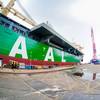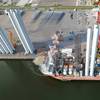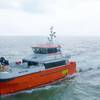The shipbuilding unit of South Korea's troubled Daewoo Group expects a net profit and more profitable orders in 2001 as it charts a new, independent course. Daewoo Shipbuilding & Engineering Co, split off from troubled Daewoo Heavy Industries last October, said it aimed for net profit of $156.7 million this year, buoyed by strong global orders. "It looks certain that Daewoo Shipbuilding has a great business year ahead of it," said Song Sang-hoon, analyst at Dongwon Economic Research Institute. "But it has still to calm European shipbuilders' criticism that Korean shipyards, especially Daewoo, are suspected of dumping practices."
It also plans to repay 200 billion won of debt this year to free itself from a debt restructuring program undertaken by its creditors in 1999, Daewoo officials said. "Our losses in the past stemmed from problems of other Daewoo affiliates," shipyard spokesman Kim Do-kyun said. "But we are confident of making profits from this year after cutting ties with them."
Last October, Daewoo Heavy Industries was split into three firms -- a shipbuilding unit, a heavy industries unit and a third firm to handle the former firm's debts. Daewoo Heavy made a net loss of 3.4 trillion won in the first three quarters of 2000 as it settled unpaid deals with other Daewoo firms and took up losses from its investment in bankrupt Daewoo Motor, in which it had a 49.8 percent stake. A loss of 3.97 trillion won in 1999 stemmed from similar reasons, Daewoo officials said. Daewoo Heavy, along with 11 other highly-leveraged Daewoo Group companies, was rescued by creditors in August 1999 after a recession the previous year made it impossible to operate.
"In 2000, the shipbuilding unit of Daewoo Heavy benefited from an overall shipbuilding boom for South Korean companies," said Kim of Daewoo. Daewoo received $3.3 billion in shipbuilding orders in 2000 and its order backlog, estimated at $4.5 billion, is enough to keep its shipyard fully occupied for the next two and half years, he said. It said it is now in a position to be selective in receiving orders and plans to add $2.5 billion worth of orders this year, focused on high value-added VLCC and LNG vessels. Despite the fall in new orders, it said sales would rise to 2.86 trillion won, up six percent from 2.7 trillion won a year earlier. Sales revenues usually come about two years after orders because payments are spread out over the time between the initial contract and delivery.
In December, creditors led by Korea Development Bank increased paid-in capital in the shipbuilder to 992.9 billion won via 747 billion won in debt-to-equity swaps. Daewoo Shipbuilding's assets are now valued at 4.04 trillion won, against 3.05 trillion won in liabilities. Analysts said prospects for turning the company around looked bright, and would brighten further if its quest for foreign capital proved successful.
The shipbuilder is negotiating a partnership with an Australian firm, and shipbuilders in Europe have expressed interest in business opportunities involving Daewoo. Part of the criticism the firm faces about what European competitors call dumping stems from loan incentives Daewoo Shipbuilding has received under its debt workout program.
Featured videos

Tracking Foreign Vessels Working in the U.S. Jones Act Market

Inside the Electrified Truckable Tug

Inmarsat Enhances Service to Drive Digitalization
Subscribe for
Maritime Reporter E-News
Maritime Reporter E-News is the maritime industry's largest circulation and most authoritative ENews Service, delivered to your Email five times per week









